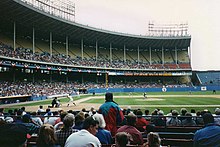
Lynn Nolan Ryan Jr., nicknamed "the Ryan Express", is an American former Major League Baseball (MLB) pitcher and sports executive. Over a record 27-year career that included play in four decades, Ryan pitched for the New York Mets, California Angels, Houston Astros, and Texas Rangers. He was inducted into the Baseball Hall of Fame in 1999. After his retirement in 1993, Ryan served as chief executive officer (CEO) of the Texas Rangers and an executive advisor to the Houston Astros. He is widely considered to be one of the best MLB pitchers of all time.
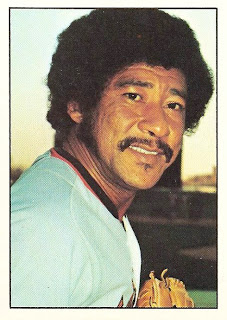
Miguel Ángel Cuellar Santana was a Cuban professional baseball player. He played for 15 seasons in Major League Baseball as a left-handed pitcher in 1959 and from 1964 through 1977, most prominently as a member of the Baltimore Orioles who won the American League (AL) pennant in each of Cuellar's first three seasons with the team. During that time, Cuellar and the Orioles won the 1970 World Series. Cuellar also played for the Cincinnati Reds, St. Louis Cardinals, Houston Astros and California Angels.

José Dennis Martínez Ortiz, nicknamed "El Presidente", is a former Major League Baseball pitcher. He was the first Nicaraguan to play in the majors.

Thomas Edward John Jr., nicknamed "The Bionic Man," is an American retired professional baseball pitcher who played in Major League Baseball (MLB) for 26 seasons between 1963 and 1989. He played for the Cleveland Indians, Chicago White Sox, Los Angeles Dodgers, New York Yankees, California Angels, and Oakland Athletics. He was a four-time MLB All-Star and has the third-most wins (288) of any pitcher since 1900 not in the Hall of Fame. Known for his longevity, John was the Opening Day starter six times – three for the White Sox and three times for the Yankees. His 1982 start was not the first game of the season, but he started the second game of a doubleheader on Opening Day.
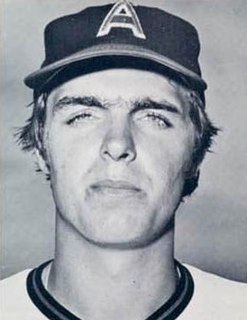
Frank Daryl Tanana is an American former professional baseball left-handed pitcher. In a Major League Baseball career that stretched from 1973 to 1993, he pitched for the California Angels, Boston Red Sox, Texas Rangers, Detroit Tigers, New York Mets, and New York Yankees. He struck out 2,773 batters in his career and twice won playoff-clinching games for the teams he was on, the 1979 Angels and the 1987 Tigers.

Wilbur Forrester Wood Jr. is an American former professional baseball pitcher. In a 17-year Major League Baseball (MLB) career, he pitched for the Boston Red Sox (1961–64), the Pittsburgh Pirates (1964–65), and the Chicago White Sox (1967–78). A knuckleball specialist after joining the White Sox, he threw left-handed and batted right-handed.
Carl Wendle Morton was an American professional baseball player. He played in Major League Baseball as a right-handed pitcher from 1969 through 1976 for the Montreal Expos and the Atlanta Braves. Morton was named the NL Rookie of the Year in 1970 and posted a career record of 87–92 with 650 strikeouts and a 3.73 ERA in 1648.2 innings.
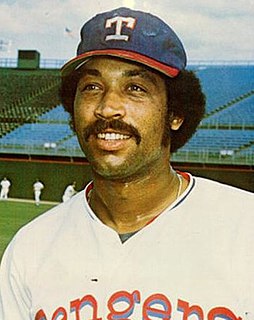
James Blair Bibby was an American Major League Baseball right-handed pitcher. During a 12-year baseball career, he pitched from 1972 to 1984 with the St. Louis Cardinals, Texas Rangers, Cleveland Indians, and Pittsburgh Pirates, with whom he was a member of its 1979 World Series champions. In 1973, Bibby pitched a no-hitter against the Oakland Athletics. Also, in 1981, as a member of the Pirates, he missed out on a perfect game by just one hit, allowing a lead off single, before retiring the next 27 batters he faced.

Wilmer Dean Chance was an American professional baseball player. A right-handed pitcher, he played in 11 Major League Baseball seasons for the Los Angeles / California Angels, Minnesota Twins, Cleveland Indians, New York Mets and Detroit Tigers. With a touch of wildness and the habit of never looking at home plate once he received the sign from his catcher, Chance would turn his back fully towards the hitter in mid-windup before spinning and unleashing a good fastball, sinker or sidearm curveball.
Arthur Lee Guetterman, nicknamed "Goot," is an American former professional baseball pitcher who played from 1984 to 1996 for the Seattle Mariners, New York Yankees, New York Mets, and St. Louis Cardinals of Major League Baseball (MLB). A southpaw used primarily in the major leagues as a relief pitcher, he stood 6 feet 8 inches (2.03 m) tall. He led the Yankees in wins in 1990 without starting a game.

Daniel Osinski, nicknamed "The Silencer", was an American Major League Baseball relief pitcher. The 6 ft 2 in (1.88 m), 195 pounds (88 kg) right-hander was signed by the Cleveland Indians as an amateur free agent before the 1952 season. He played for the Kansas City Athletics (1962), Los Angeles Angels (1962–1964), Milwaukee Braves (1965), Boston Red Sox (1966–1967), Chicago White Sox (1969), and Houston Astros (1970).
Bradley David Havens is a former Major League Baseball pitcher for the Minnesota Twins (1981–83), Baltimore Orioles (1985–86), Los Angeles Dodgers (1987–88), Cleveland Indians (1988–89) and Detroit Tigers (1989).

Charles Leonard Estrada is an American former professional baseball player. He played in Major League Baseball as a pitcher from 1960 to 1967, playing for the Baltimore Orioles, Chicago Cubs, and New York Mets. After his retirement from the major leagues, Estrada served as pitching coach in the majors.

Lewis Bernard Krausse Jr. was an American professional baseball pitcher who played 12 seasons in Major League Baseball (MLB). He played for the Kansas City / Oakland Athletics, Milwaukee Brewers, Boston Red Sox, St. Louis Cardinals, and Atlanta Braves from 1961 to 1974. He batted and threw right-handed and served primarily as a starting pitcher. Once a highly-touted prospect, he had to overcome arm trouble early in his career and spent most of his career with teams that offered low run support.
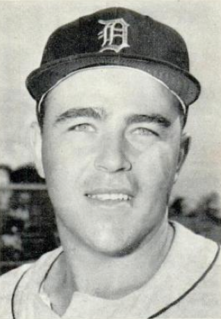
Ned Franklin Garver was an American professional baseball pitcher. He played in Major League Baseball (MLB) for the St. Louis Browns (1948–1952), the Detroit Tigers (1952–1956), the Kansas City Athletics (1957–1960), and the Los Angeles Angels (1961). Garver and Irv Young were the only pitchers in the 20th century to win 20 or more games for a team that lost 100 games.

Lloyd Cecil Allen is a former professional baseball pitcher, who played in Major League Baseball (MLB) for the California Angels (1969-1973), Texas Rangers (1973-1974), and Chicago White Sox (1974-1975). He was the first big league player born in the 1950s to appear in a regular-season game.

Jackie Gene Brown was an American professional baseball pitcher and coach, who played in Major League Baseball (MLB) for the Washington Senators / Texas Rangers, Cleveland Indians, and Montreal Expos from 1970 –1977. Brown threw and batted right-handed. His older brother, Paul Brown, also pitched in the big leagues.
The 1973 Texas Rangers season involved the Rangers finishing sixth in the American League West with a record of 57 wins and 105 losses.
Charles Hudson is a former left-handed Major League Baseball pitcher who played from 1972 to 1975 for the St. Louis Cardinals, Texas Rangers and California Angels. He was 6'3" tall and he weighed 185 pounds. He attended Tupelo High School in Tupelo, Oklahoma.

Vincent Norman Colbert is an American former Major League Baseball pitcher who appeared in 95 total games, 74 as a relief pitcher, for the Cleveland Indians from 1970 to 1972. Born in Washington, D.C., he threw and batted right-handed, and was listed as 6 feet 4 inches (1.93 m) tall and 200 pounds (91 kg).

